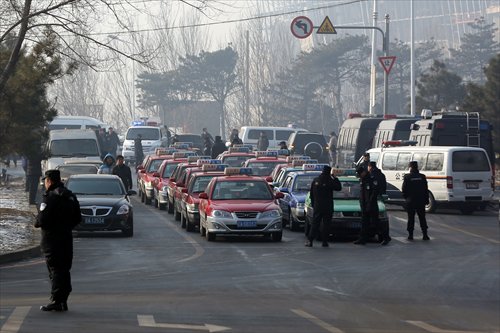Car-hiring apps facing crackdowns
Regulation a key issue as local authorities issue bans on services

Police watch over cabs parked on a main street in Shenyang by striking taxi drivers Sunday. Photo: CFP

Experts said more government crackdowns on unlicensed vehicles, especially car-hiring services offered by taxi-hailing app companies, could hurt the emerging business after a strike was held by taxi drivers in a Northeast Chinese city.
Thousands of taxi drivers in Shenyang, capital of Northeast China's Liaoning Province, held a strike on Sunday, the first working day of 2015, to express their discontent over unlicensed vehicles using car-hiring apps run by leading Chinese taxi-hailing players Didi Dache and Kuaidi Dache, news portal china.com.cn reported on Monday.
While benefiting from the taxi-hailing apps, taxi drivers are concerned with the low-end car-hiring services offered by the two companies, according to media reports.
Kuaidi Dache, which operates the Kuaidi ONE car-hiring services, said Kuaidi and its partners operate on firm legal ground in Shenyang.
"What Kuaidi is trying to do is to tap the new market rather than consume the existing market of taxis," Ye Yun, PR manager for KuaiZhi Technology Co, the developer of Kuaidi Dache, told the Global Times Monday.
Didi Dache, which started offering its Didi Zhuanche services in August, could not be reached by press time.
Didi Dache and Kuaidi Dache are backed by Internet giants Tencent Holdings and Alibaba Group Holding respectively.
Zhao Zhanling, an Internet law expert, believes more cities would follow up with crackdowns in the future which will affect the growth of the nascent car-hiring services.
"The total number of licensed cars are limited and could not meet market demand for car-hiring platforms. And with the car-hiring market growing rapidly, more privately owned cars have signed up with the car-hiring companies," Zhao told the Global Times Monday.
"The emerging car-hiring business will be hurt if the local governments choose to crack down on this market, and this will also hurt market demand," Zhao said.
The Shenyang traffic authority was unable to respond to a Global Times inquiry by press time on Monday.
But the Shenyang traffic authority said in a statement, posted on its website on October 28, 2014, that it would, in light of unlicensed vehicles using Internet-based technology and mobile phones to engage in car-hiring services, crack down on private car owners engaging in unlicensed taxi services and car-hiring companies that permit the use of unlicensed private cars.
The incident in Shenyang happened as more Chinese cities have intensified their regulations on unlicensed vehicles recently.
Traffic authorities in Shanghai, Nanjing, capital of East China's Jiangsu Province, and Zibo, a city in East China's Shandong Province, have made similar announcements since November last year, according to media reports.
The app service providers might have become a scapegoat for complicated social issues, an industry insider told the Global Times Monday.
"The Shenyang traffic authority's longtime ineffectiveness in cracking down on unlicensed vehicles and the removal of fuel surcharges have lowered taxi drivers' incomes while the impact of car-hiring apps is still not measurable," the insider said.
Zhang Zhuting, a law professor at the Transport Management Institute at the Ministry of Transport, said the car-hiring business offered by Didi Dache and Kuaidi Dache has positive aspects.
"The fusion of Internet technology and urban public transportation, of which taxi service is a component, should be encouraged as the software connects passengers and vehicles looking to provide taxi service and improves efficiency," Zhang told the Global Times Monday.
As the two industries merge, legal boundaries must be clarified to define the nature of the business, Zhang said.
Zhao said there is currently no law that requires Didi Dazhe and Kuaidi Dazhe to verify the legal soundness of drivers and vehicles operating on its platforms.
"Different companies run under different models, and their businesses in different cities vary. This is further affected by different laws in different localities and different levels of law enforcement," Zhao said.
This begs the question about whether amendments should be made to existing laws and regulations governing the car-hiring business in the face of the new emerging business models made available by Internet technologies, Zhao said.